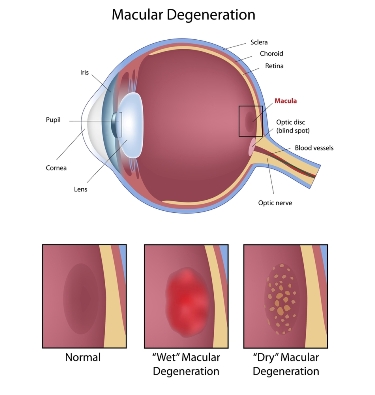
Macular Degeneration Awareness Week 2012 will run from the 27th of May. Image: Shutterstock
A team of researchers from Trinity College Dublin have found that controlling an inflammatory component known as IL-18 could prevent the development of macular degeneration.
Age-related macular degeneration (AMD) is one of the most common forms of blindness in people over the age of 50. More than 1 million Australians over the age of 50 have some evidence of MD, and according to the Macular Degeneration Foundation the number will rise to 1.7 million in the next 20 years.
Macular degeneration affects the central vision. It is caused by small accumulations of drusen (hyaline bodies) underneath the retina. Although there is no known cure for this blinding disease, researchers worldwide are trying to come up with a solution that slows down the progression of AMD.
A team of researchers from Trinity College’s Ocular Genetics Unit found that controlling the inflammatory component IL-18 could prevent the development of this disease. “Traditionally, inflammation in the retina or indeed the eye in general is not beneficial and is a pathological hallmark of many eye diseases, including AMD. However we have identified, that one inflammatory component termed IL-18 acts as a so-called anti-angiogenic factor, preventing the progression of wet AMD” said Dr Matthew Campbell, one of the leading co-authors of the study published in Nature Medicine.
Dry MD is caused by the death of retinal cells, which leads to patches of “˜missing’ retina. When blood and other fluids leak because of the abnormal growth of blood vessel under the retina dry MD becomes wet MD, the most severe form of macular degeneration.

Macular Degeneration. Image: Alila Sao Mai
“The progression from dry to wet AMD appears to be mediated by the inflammatory component IL-18, our results directly suggest that controlling or indeed augmenting the levels of IL-18 in the retinas of patients with dry MD could prevent the development of the wet form disease, which leads us to an exciting new prospect for a novel therapy for MD,” said Trinity College scientist Dr Sarah Doyle.
Source: Eurekalert







kpyogaraajan group
April 10, 2012
good